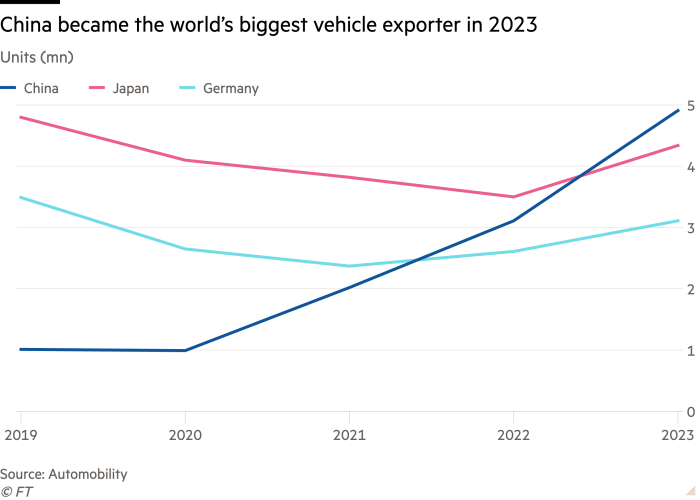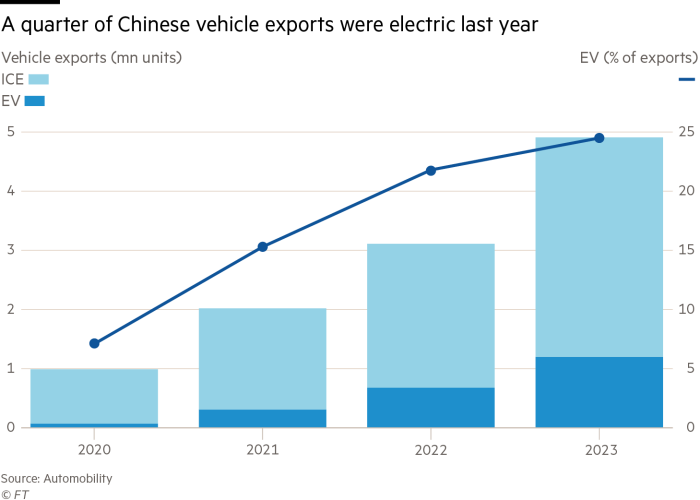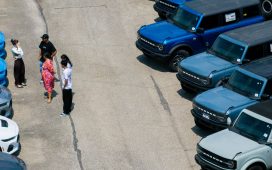Chinese companies across the electric vehicle supply chain said lower costs and technological leadership would help them secure western deals despite geopolitical tensions and security concerns.
Companies producing everything from EV chassis and autonomous driving software to the cobalt and nickel used in batteries are hoping to find overseas partners, despite US and European angst over the rise of China as a technological superpower.
Paul Li, founder of Chinese electric vehicle parts supplier U-Power, claims working with the country’s EV sector, which is by far the world’s biggest, can mean foreign companies developing cars years faster than they have traditionally and reducing costs by as much as half.
As evidence that foreign carmakers are realising the advantages, he points to Volkswagen’s $700mn tie-up with Chinese rival Xpeng last year. That deal was soon followed by a €1.5bn investment in Chinese EV start-up Leapmotor by Stellantis, which makes Jeep cars in the US and owns the Fiat and Citroën brands in Europe.
“Those global corporates already proved that even the biggest automotive [manufacturers] today have to purchase China’s solutions in order to save time as well as get a lot more competitive products,” Li said.
Li’s company, which has offices in Hefei, near Shanghai, as well as in Silicon Valley, designs and sells EV chassis — known as skateboards.
U-Power last month signed a deal to supply New York-based EV start-up Olympian Motors with its skateboards. The company is also working with Singapore-based FEST Auto to sell EVs to the European logistics market.
In another example, Shenzhen-based Appotronics, which provides laser projectors for nearly half of China’s cinemas, will supply BMW with laser technology for some of the German group’s latest in-car displays. And Shenzhen-based DeepRoute.ai, which already has a US office, is now setting up one in Europe to sell its mapping technology for driverless cars.

The trend highlights Chinese confidence that trade tensions and decoupling moves will be trumped by Europe and the US needing help to build up their local EV industries, after being slower than their Chinese counterparts to adapt to the transformation to smarter, cleaner vehicles.
“Even the US is aware there needs to be some level of potential for Chinese involvement — it can be very controlled, but there needs to be some level,” said Cory Combs, associate director at the Beijing-based Trivium China consultancy.
Chinese companies are also developing new approaches to gain a foothold in foreign markets, rather than just exporting products from China. That includes setting up factories and research centres in Europe and North America, as well as forming joint ventures with European and US companies.
BYD, the world’s biggest electric-vehicle manufacturer and key Tesla rival, has announced plans to build a factory in Hungary and is looking at production sites in Mexico, as it eyes sales in Europe and the US. The potential investments come in the face of an EU trade investigation into the Chinese EV industry and the Biden administration’s Inflation Reduction Act (IRA), which does not allow Chinese companies to benefit from generous subsidies on American soil.
Some Chinese producers of EV battery materials are taking an even more circuitous route to western markets by setting up joint ventures with South Korean industrial groups. They include Zhejiang Huayou Cobalt, China’s biggest producer of the key battery material, and Shanghai-listed Ronbay Technology, which dominates the global market for high-nickel cathode electrodes, as well as smaller battery material groups CNGR Advanced Material and GME Resources.
Experts say that the Biden administration has not yet made clear whether such arrangements will be allowed under the IRA’s foreign entities of concern rules. “The best we can tell is if you’re a non-state actor or non-state owned . . . you can create a subsidiary that is not domiciled in China and actually get around [the IRA],” said Combs of Trivium.

Marina Zhang, an expert in Chinese industry and innovation at the University of Technology Sydney, said western reticence about “locking into” China-dependent supply chains had intensified in recent years.
“Any investment from China, especially state-owned or state-backed companies, or even companies perceived to be associated with a state, are raising alerts immediately. Before we were talking about the military, telecommunications, now we’re talking about critical minerals, energy,” she said.
However, Matt Sheehan, an expert on US-China technology co-operation and competition for the Carnegie Endowment for International Peace, a Washington think-tank, argues that the US needs to recognise where it can learn from China in low-carbon technologies as it builds its own cleantech industry.
That should include forging deeper ties between the state of California, which has existing climate-focused co-operation with China, and Chinese counterparts, as well as research collaboration and cross-border venture capital flows, he wrote last year, while noting: “Doing this will take courage and creativity.”
Li, of U-Power, is among Chinese EV executives who want their companies to be seen as “global”. To that end, his company’s US unit is a separate legal entity, with an independent share structure, rather than having the status of being a subsidiary of the Chinese business.
“I don’t know how the regulators will see this, but I label [the company] as a global operation,” he said.
Additional reporting by William Langley in Hong Kong









